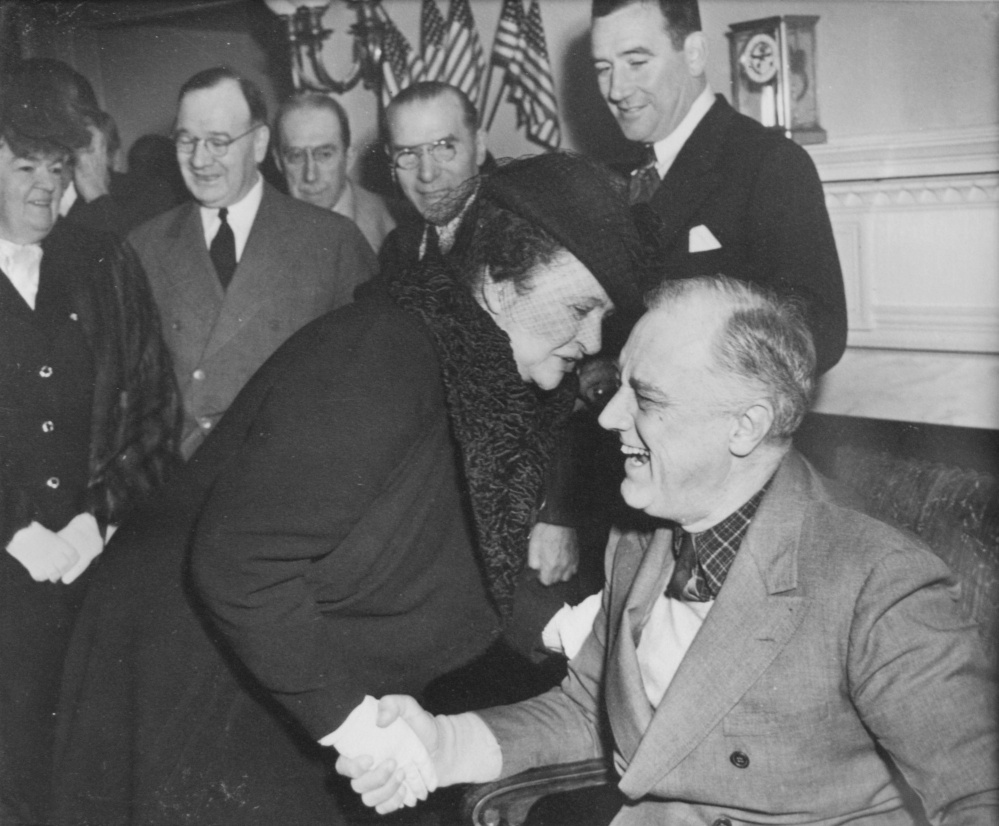Christianity is a religion of conversion, both a turning from and a turning toward. Christian conversion takes diverse forms. In many cases, there is not simply one conversion per person, but a series of turnings toward. These turnings toward can include, for example, turning toward God, Christ, the church, the sacraments, the Scriptures. Conversions (and reconversions) can be subtle or dramatic, gradual or sudden.
There can be conversion toward the world. Here the world is not to be taken as creation or society organized against God, but rather creation or society as beloved by God and suffering because of human sin, as broken and desperate for repair.
The Christian converted to the world responds to the world’s belovedness and brokenness through compassionate service, which may include political action. This was true of Frances Perkins, a devout Christian (specifically an Episcopalian) who served as President Franklin D. Roosevelt’s secretary of labor and is rightly seen as “the woman behind the New Deal.” Perkins recognized the world as beloved by God. She saw its brokenness and responded through compassionate service that led her to high public office.
Even when a Christian’s conversion to the world is a gradual process, in many cases there can be an episode that proves to be pivotal. One such episode, perhaps the most significant one for Frances Perkins, began on March 25, 1911, when she became an eyewitness to the Triangle Shirtwaist Fire.
That afternoon, Perkins was visiting at the home of a friend who lived on Washington Square in Manhattan. The guests were just sitting down to tea when fire whistles and shouts disrupted them. A big fire was blazing across the square. Perkins saw flames coming out of a 10-story building that housed the Triangle Shirtwaist company and where hundreds of workers were employed, most of them young and impoverished immigrant women. The building was a crowded, dangerous firetrap with locked doors. Firefighters on the street did not have ladders long enough to make a difference, and many workers fell or jumped to their deaths.
Frances Perkins was deeply shaken by what she saw. She knew that almost two years earlier, these workers had been rebuffed and persecuted for complaining about the conditions where they worked.
A week later, Perkins attended a public meeting at the Metropolitan Opera House called by a group of leading citizens.
Rose Schneiderman, an immigrant trade union leader, and like Perkins, in her early 30s, gave a historic address, speaking passionately about the numerous workers maimed and killed because of horrendous sweat-shop conditions.
Frances Perkins took what she heard as a call to action. She began to realize that much more might be required of her than she had previously imagined. She recognized that making workplaces safer and more humane called for a lifelong commitment on her part. She also saw that the Triangle Shirtwaist Fire could be the starting point for significant social change.
Journalist Will Irwin, a close friend of hers, put it this way: “What Frances Perkins saw that day started her on her career.” True enough. But for this woman of faith, it was also a major moment in her continuing conversion to the world, which came to be immensely fruitful for the world. In 2009, the Episcopal Church added to its calendar a May 13 feast day in honor of Frances Perkins.
Some politicians today readily talk about their faith when they believe that doing so may win them public support. The Constitution disallows a religious test for public office. So does my Christian conscience.
When it comes to deciding how to vote, I am not concerned with the conversions that a candidate may have experienced, with but one exception. I would like to know if the candidate has undergone significant conversion to the world.
Such conversion can happen to people of different religious commitments or none at all. What matters to me is whether or not the candidate deeply recognizes the beauty and brokenness of creation and humanity and wants to share in what a phrase from Judaism calls “the healing and transformation of the world.” And as a sign of this conversion, I do not rely on anything other than the candidate’s record of attitudes and actions.
Send questions/comments to the editors.



Comments are no longer available on this story